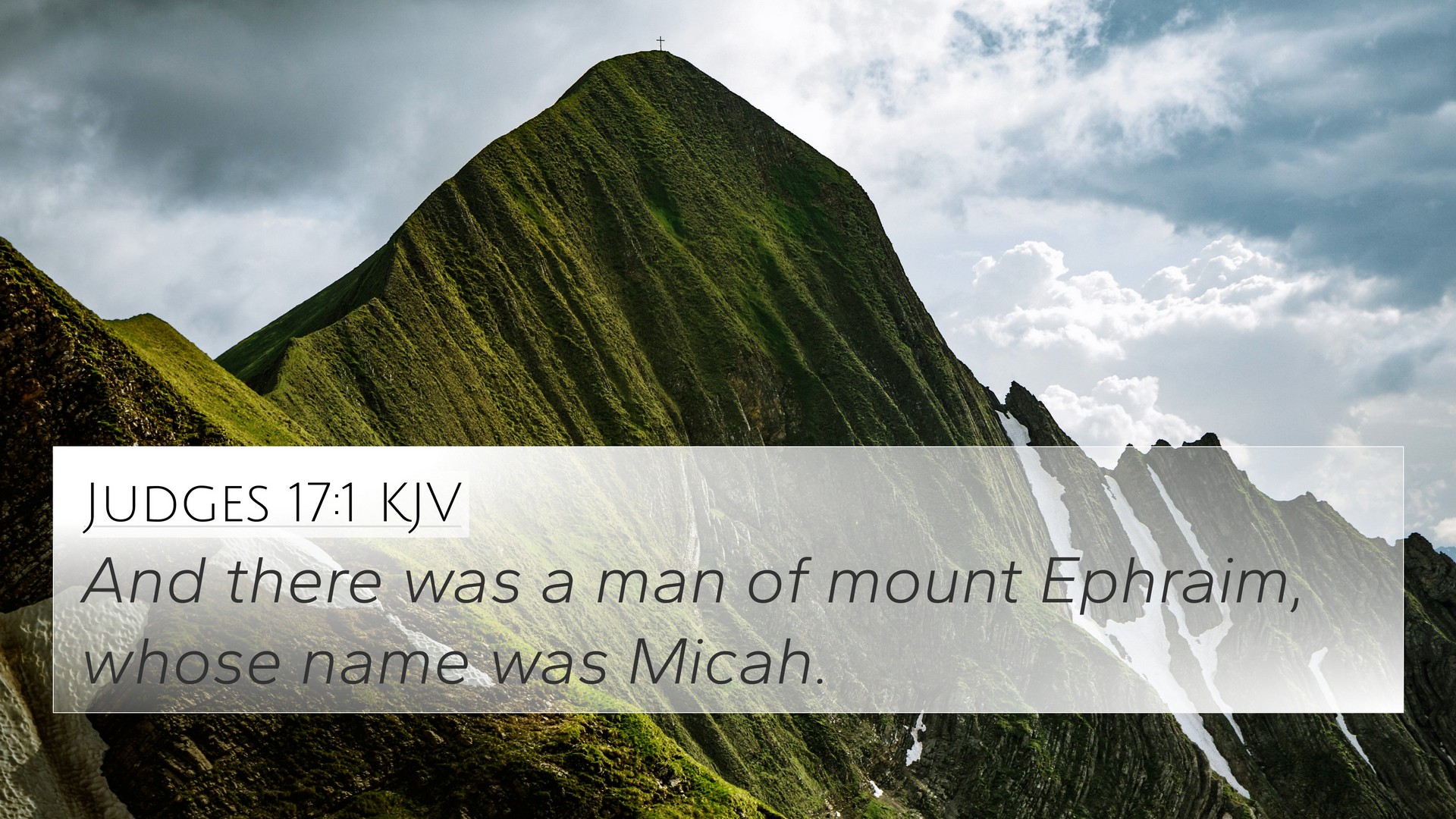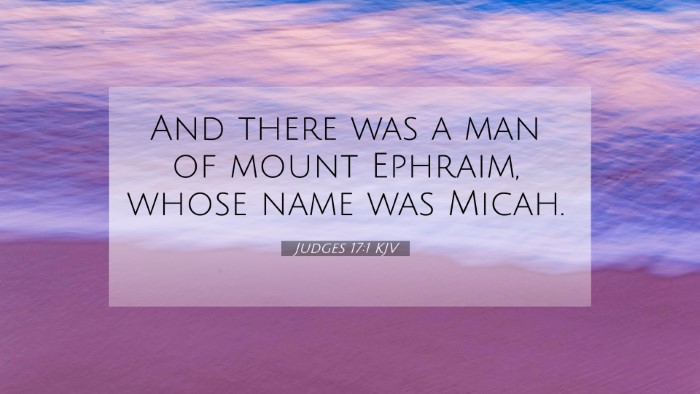Old Testament
Genesis Exodus Leviticus Numbers Deuteronomy Joshua Judges Ruth 1 Samuel 2 Samuel 1 Kings 2 Kings 1 Chronicles 2 Chronicles Ezra Nehemiah Esther Job Psalms Proverbs Ecclesiastes Song of Solomon Isaiah Jeremiah Lamentations Ezekiel Daniel Hosea Joel Amos Obadiah Jonah Micah Nahum Habakkuk Zephaniah Haggai Zechariah MalachiJudges 17:1 Similar Verses
Judges 17:1 Cross References
And there was a man of mount Ephraim, whose name was Micah.
Uncover the Rich Themes and Topics of This Bible Verse
Listed below are the Bible themes associated with Judges 17:1. We invite you to explore each theme to gain deeper insights into the Scriptures.
Judges 17:1 Cross Reference Verses
This section features a detailed cross-reference designed to enrich your understanding of the Scriptures. Below, you will find carefully selected verses that echo the themes and teachings related to Judges 17:1 KJV. Click on any image to explore detailed analyses of related Bible verses and uncover deeper theological insights.
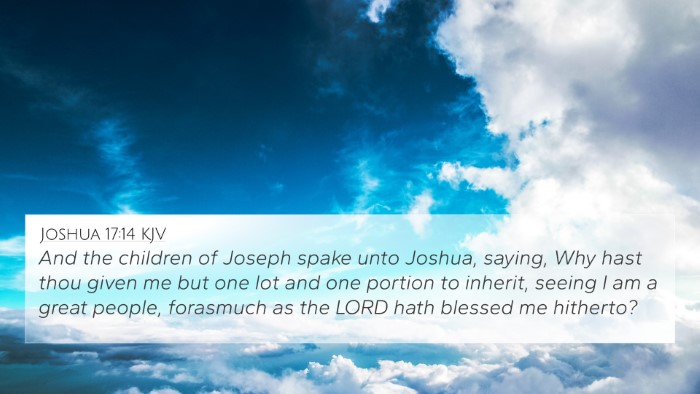
Joshua 17:14 (KJV) »
And the children of Joseph spake unto Joshua, saying, Why hast thou given me but one lot and one portion to inherit, seeing I am a great people, forasmuch as the LORD hath blessed me hitherto?

Joshua 15:9 (KJV) »
And the border was drawn from the top of the hill unto the fountain of the water of Nephtoah, and went out to the cities of mount Ephron; and the border was drawn to Baalah, which is Kirjathjearim:
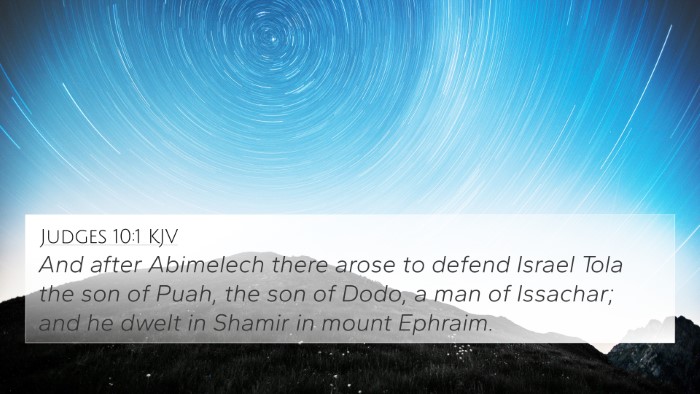
Judges 10:1 (KJV) »
And after Abimelech there arose to defend Israel Tola the son of Puah, the son of Dodo, a man of Issachar; and he dwelt in Shamir in mount Ephraim.
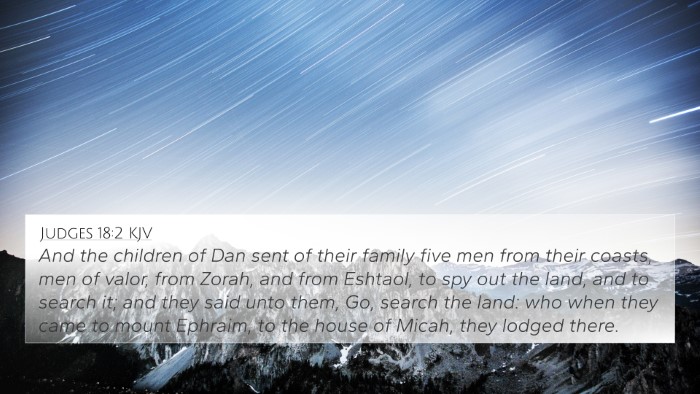
Judges 18:2 (KJV) »
And the children of Dan sent of their family five men from their coasts, men of valor, from Zorah, and from Eshtaol, to spy out the land, and to search it; and they said unto them, Go, search the land: who when they came to mount Ephraim, to the house of Micah, they lodged there.
Judges 17:1 Verse Analysis and Similar Verses
Bible Verse Meaning and Interpretation: Judges 17:1
Bible Verse: Judges 17:1 - "There was a man ofMount Ephraim, whose name was Micah."
Overview
The passage in Judges 17:1 introduces Micah, a man from the tribe of Ephraim, setting the stage for a narrative filled with religious and moral themes. The story unfolds the personal and communal implications of idolatry in Israel during a time of spiritual decline.
Insights from Public Domain Commentaries
- Matthew Henry:
Henry notes the significance of Micah's name, as it means "Who is like Yahweh?" This sets an ironic tone for the ensuing narrative as Micah contrasts God's true nature with the idolatry he engages in. The commentary emphasizes the spiritual decay of Israel and how Micah's actions reflect a personal and societal turning away from God.
- Albert Barnes:
Barnes highlights that Micah’s story illustrates the importance of personal initiative in religious practice. He emphasizes that Micah's actions symbolize the flawed understanding of worship, as he creates his own religious practices rather than adhering to the established norms. This deviation serves as a microcosm of the larger national apostasy.
- Adam Clarke:
Clarke draws attention to the geographical significance of Ephraim, a central region for Israel. He suggests that Micah’s location impacts the identity of the idolatrous practices he adopts. According to Clarke, this narrative highlights the breakdown of the central worship that should have been focalized in Jerusalem, leading to chaos and personal interpretation of worship.
Thematic Analysis
This verse presents several enduring themes for consideration:
- Idolatry: Micah’s actions represent a deviation from true worship, showcasing how personal interpretations of worship can lead to broader idolatrous practices within society.
- Religious Authority: By creating a private shrine and forming a personal priesthood, Micah undermines the divinely ordained worship, raising questions about authority in religious practice.
- Spiritual Decline: The state of religion in Israel at this time reflects a broader spiritual decline. Micah's story stands as a caution against the dangers of individualism in spirituality.
Cross References
Judges 17:1 connects to several other scriptures that illuminate its themes:
- Exodus 20:4-5: Prohibition against making idols.
- Judges 18:30-31: The continuation of Micah’s story and the progression of idolatry.
- 1 Samuel 15:23: Rejection of God's ways leads to rebellion.
- Proverbs 14:12: Warning against following one's own understanding.
- Deuteronomy 12:8-14: Instructions for proper worship and the dangers of personal altars.
- Isaiah 44:9-20: The futility of idol-making compared to the Creator.
- Jeremiah 2:13: The problem of forsaking the living God for broken cisterns.
Connections between Bible Verses
Building connections between scripture is critical for understanding Biblical narratives. Judges 17:1 exemplifies this necessity as it reflects themes present throughout both the Old and New Testaments. Below are some thematic connections:
- Linking to the Ten Commandments: Micah’s actions directly violate the commandments against idolatry, establishing a theme of disobedience prevalent throughout scripture.
- Comparative Analysis with 1 Kings 12: The schism in Israel’s worship practices initiated by Jeroboam can be viewed alongside Micah’s personal worship deviations.
- Parallels with New Testament Letters: The call for true worship in spirit and truth (John 4:24) provides a connection to the idolatrous practices Micah engages in.
Bible Verse Parallels and Thematic Connections
Examining Judges 17:1 alongside other passages can provide deeper insight into the Biblical narrative. For example:
- Micah's creation of idols mirrors the sin of the Golden Calf (Exodus 32).
- Micah’s personal priest, an Ephraimite, reflects the broader issue of rogue priests in Israel as seen in 1 Samuel.
SEO Content Integration
For those exploring Bible verse interpretations, understanding the connections between Bible verses can lead to deeper insights. Tools for Bible cross-referencing play a crucial role in this exploration.
Using a Bible concordance or a Bible cross-reference guide can help identify themes and verse parallels, enhancing your study of Judges 17:1.
Choosing to engage in cross-referencing Bible study methods allows one to uncover the layers of meaning and the complex inter-Biblical dialogue present in scripture.
